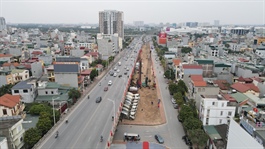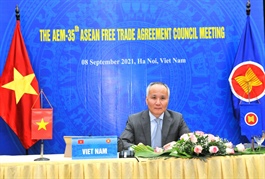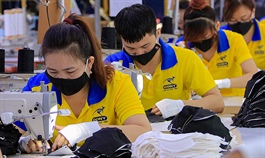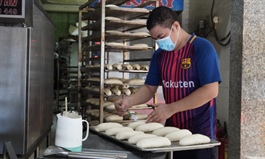Firms to pursue dual-target strategy
Firms to pursue dual-target strategy
Vietnamese firms are to continue with the country's dual-target strategy, which consists of a number of measures to limit the spread of the novel coronavirus while at the same time keep operations running, heard an online conference organised by the Vietnam Chamber of Commerce and Industry (VCCI) yesterday. 
Speaking at the event, Nguyen Quang Vinh, secretary-general of the chamber urged businesses to work together during the pandemic.
"Besides support from the government, each and every business must find their own strength to adapt and overcome with the highest priority being how to achieve long-term and sustainable development," Vinh said.
The chamber has kickstarted an initiative to help businesses connect, pool experience and resources to overcome obstacles and bounce back stronger once the virus is put under control.
The World Bank's representative in Viet Nam Dorsati Madani stressed the importance for the Southeast Asian economy to quickly check the spread of the virus and vaccinate the population, saying it was the foundation for maintaining growth for 2021-22.
Viet Nam has been forecast to see a strong recovery during the last quarter with an annual 4.8 per cent GDP growth by the end of the year, according to a recent World Bank report. The government, however, must remain vigilant in its effort to control risks and bad debts.
During the conference, businesses voiced concerns over numerous threats faced by the country's supply chain.
"The pandemic has delivered a strong blow to the business community. As the country's supply chain has been severely disrupted, businesses have been struggling to deal with depleted financial resources and shortages of workers," Vinh said.
"All this on top of existing problems including poor crisis handling and subpar management capacity in many businesses," he said.
For certain industries, it's more difficult to keep going.
Phan Thi Thanh Xuan, a representative of the Vietnam Leather, Footwear and Handbag Association (LEFASO), said due to the industry's labour-intensive nature it's simply out of the question to sustain the financial burden to house and feed thousands of workers in factories, which were not built for such purposes.
She called for the establishment of buffer zones to protect industrial complexes, on-site medical facilities and more robust implementation of technology in anti-COVID-19 efforts as a long-term solution to the pandemic and should be continued even after the outbreak was put under control.
Firms have been calling for other measures to be taken to protect the supply chain including vaccinating the labour force, giving autonomy to businesses on how to maintain operations during the pandemic (in accordance with COVID-19 prevention guidance issued by the Ministry of Health), streamlining and digitalising administrative protocols for COVID-19 prevention, said Binu Jacob, director-general of Nestle Viet Nam.
Many businesses, however, have shown remarkable resilience during the pandemic, especially those who have been implementing the Corporate Sustainability Index, according to a report by VCCI.
Cao Thi Ngoc Dung, chairwoman of the board and director-general of Phu Nhuan Jewelry (PNJ), one of the largest jewellery manufacturers in Viet Nam, said PNJ sees the labour force as its most valuable asset and has taken numerous steps to protect and provide for its workers, going so far as to have its own medical teams to assist workers in need.
Dung stressed the importance of trust-building and digital information during the pandemic to make sure PNJ will stay on its best form once the market is ready for a bounce back.
Opinions and feedback gathered during the event will be submitted to the government as part of an initiative to build a recovery plan to best support business in the near future.






















